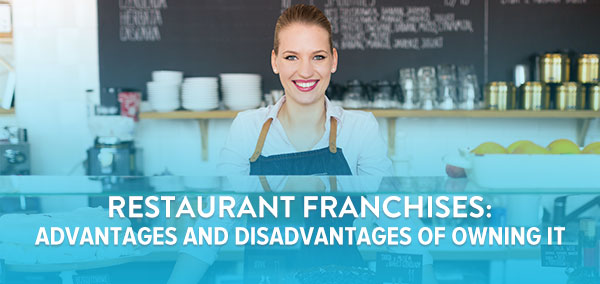Restaurant Franchises: Advantages and Disadvantages of Owning it

Restaurant Franchises are among one of the top ten franchise opportunities. It is a great business to invest in, and usually brings good return on investment (ROI).
A Restaurant franchise is a legal agreement/relationship between a franchisor (restaurant owner) and a franchisee (restaurant’s present operator). This agreement provides an opportunity to the franchise owner to start the restaurant under the same brand name.
The franchisor supports the franchisee in operating procedures, management training, and marketing. However, understanding the fine print is a requirement in any industry, and It is advisable to understand the advantages and disadvantages of owning a restaurant franchise before investing in it.
Restaurant Franchises: Advantages of owning it
1. Instant Brand Recognition
One of the advantages of a restaurant franchise is that you get instant brand recognition.
Your customers would be familiar with the brand and there is no need to gain your customers’ trust from scratch.
2. Financing Process is Easier
For any Franchise with a recognized brand, it is easier to get loans from lenders. Plus Franchise needs like supplies, equipment, furniture, etc. are usually sourced in bulk by the Franchisor.
3. Defined Training Process
Comprehensive training programs are arranged by the Franchisor before letting you start the Franchise. This helps in understanding the key factors of a successful restaurant franchise and delivering a positive customer experience.
4. Ready-to-go Business
Unlike independent food franchises, a Restaurant Franchise will receive a partial or complete turnkey delivery. It involves a comprehensive package starting from searching for a location, building design, menu, marketing, etc.
5. Anytime Guidance is Available
Most of the risks associated with a restaurant will be already addressed in the Franchise process, and if issues do crop up, restaurant franchisors are usually keen to guide you, since the last thing they want is a hit on their brand reputation.
Restaurant Franchise: Disadvantages of owning it
1. Initial Investment is High
Almost every Restaurant Franchise requires a significant investment. The franchisors expect upfront payment to spend for kitchen equipment, attorney, building maintenance, insurance, annual royalties, and many more.
2. Restricted Independence
Even if you have a creative mind, there are certain restaurant standards to be followed, which cannot be overlooked.
You own the Restaurant Franchise, not the brand. Important changes and decisions can only be taken by the brand owners and cannot be independently implemented by you.
3. Limited Expansion
Due to the franchisor’s territorial restrictions, your Restaurant Franchisee is likely to be constrained from expanding into other areas.
4. Labor Challenges Exist
Most food franchises hire low-paid employees for their business. Hiring, training to deliver acceptable quality, and retaining them will be a challenge.
5. Agreement Termination & Renewal
Deviating and breaking the brand’s standards are strictly no-go. If so, you will immediately lose the Restaurant Franchisee and the investment made in it.
Your Franchisors can also decide if they are to renew your contract or not. At the end of the contract, they can also change the terms and conditions, and royalties.
For more insights into restaurant franchises, Contact Us
